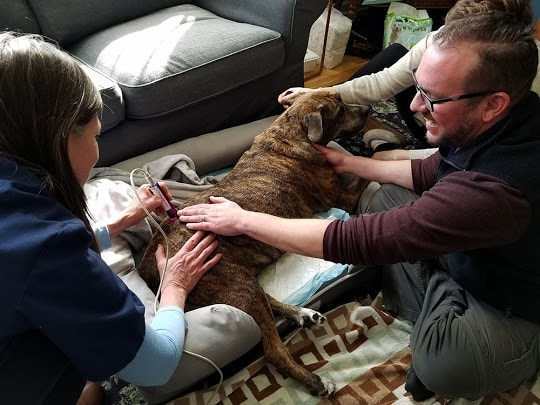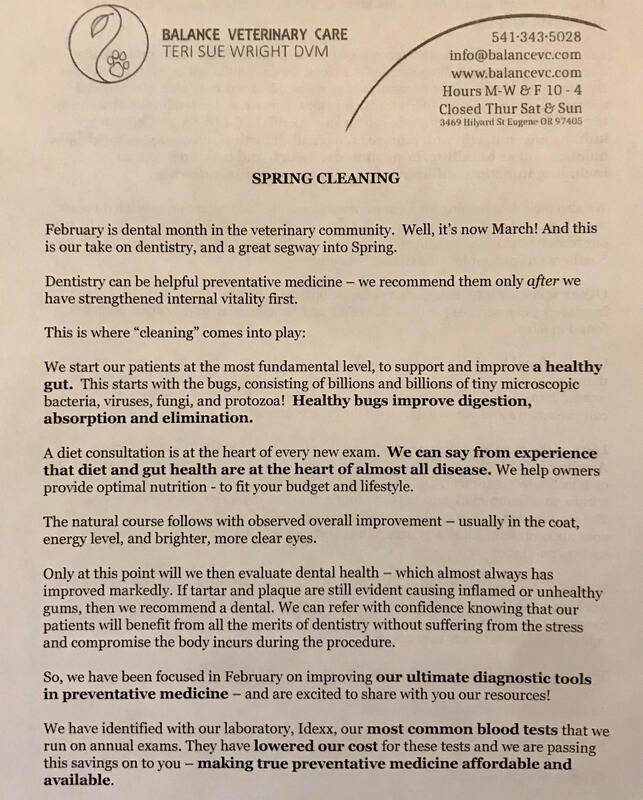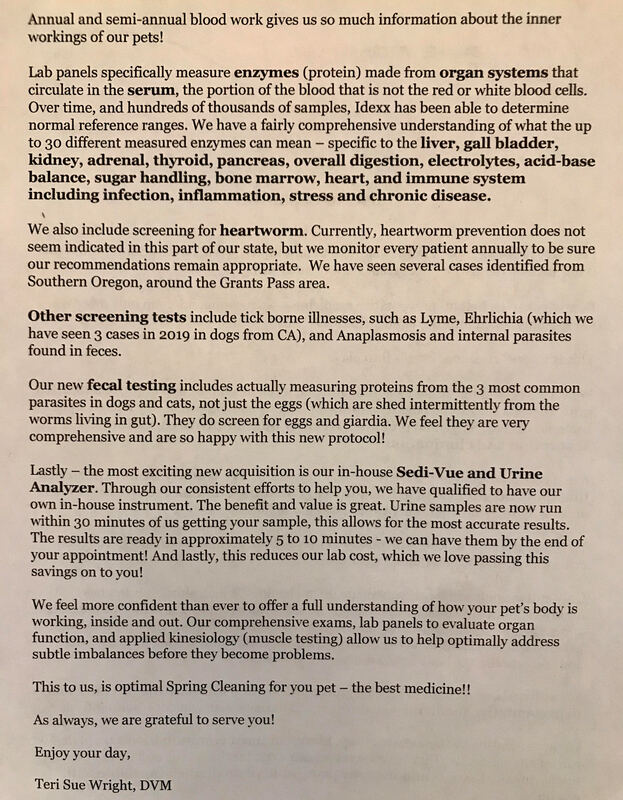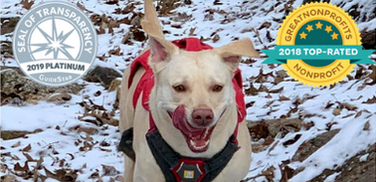|
Does your annual exam & vaccine boosters instill the comfort of knowing you are doing the best by your pet?
We want to make sure you know that you are doing the best by your pet! We help create well pets everyday – that continue to improve, and get better and better. The proof is in the pudding (our pets). We transform so many chronic ailments including long standing allergies and weakness in the hind end. We show and support our clients to proactively improve their pets’ quality of life. It’s a win-win. Please inquire to find out how holistic medicine really does make a big difference in quality of life – and how you can do it, and make it affordable. read more Our holistic approach focuses on the gut – all nutrients to rebuild tissue and heal enter the body through the gut. The gut removes toxins and eliminates all the by-products of everything that goes into your pet’s mouth, food and everything else included. And the gut contributes to the health of our immune system – of which 80% directly lines the gut. We can make a huge difference here by making just a few small changes. And keep wellness affordable. Are you buying the best, expensive kibble and canned food? What do we feed our pets? What is the best canned and grain free kibble? What are we really buying? Might the commercial pet food we feed, even the best, be contributing to factors we are completely unaware? Possibly.... Even the most expensive canned food and kibble is likely created from meat that is mass produced, and produced as inexpensively as possible. Meat that is fed corn, wheat or soy, despite the actual pet food being grain free. Are these meat animals really living a moderately humane life? Mass produced meat animals eat cheap concentrated diets; are confined in small areas; and grown to size as quickly as possible; then slaughtered after transport. These are highly stressed animals. This is human grade meat. Is this what we have to accept for our pets, let alone ourselves? Is this sustainable? Then that meat is heated to very high temperatures under pressure denaturing the protein structures that make it meat. To extrude any kibble (make it a hard, crunchy kibble, no matter how high quality the sourcing, carbohydrates must be added – usually potato, sweet potato, pea, pea protein, tomato, tomato pomace, tapioca starch. It doesn’t feel right to support our commercial food operations & CAFOs... do we have an alternative? We may not want to believe the power of how the food we feed our pets affects their health, especially long term (and our own). What can we do? Consider what we are feeding them.... (and ourselves). Take inventory. We have choices and alternatives - Consider food to be an investment, not an expense. Something that can actually support the planet while supporting ourselves and our pets. Cheap food is a short term solution – but definitely not a long term one. It’s worth investing in... at least to start thinking about. What we can do in the short term - Supplement our pets’ diets with super foods - Add chlorella, spirulina, kelp, dulce, bee pollen, fresh vegetables, bone broth (fresh made), and fermented foods (home made sauerkraut or kimchi, komboucha or raw, fermented dairy). Check out local farms – begin investing small amounts to their success as well as your pets’ (and your) nutrient benefit. High quality nutrients as nature intended = great health! Buy meat from local farms as much possible. Buy meat in bulk. Check out these local farms for yourself – Phoenix Farm, Fair Valley Farm, Deck Family Farm, Blessings Farm, Organic Redneck Farm (McKenzie River Organics), Groundworks Organics, Havurah Farm. Add healthy, whole food meats and vegetables to your pet’s diet. Make bone broth from local, fresh bones (or purchase it locally-made at Long’s Meat Market, Vanilla Jill’s or Captain Soup). Resources abound, especially in the Pacific Northwest! We have so many small local farms, ready and willing to sell super great meat – locally raised without confined small cages on nutrient rich diets directly from the earth, including fresh sunlight, grass and bugs – and super healthy, organic vegetables. (Not all farms are organic, it is worth the investment)! Sometimes local meat farms may have specials to quickly sell product that has been in the freezer for an extended period – these are great deals. Consider buying your food and your pet’s food as an investment, a long term investment. Spend a tiny bit more over time... and see the results for yourself! Consider not buying processed food all together – nothing from a box, bag or can. Wow, is that even possible? (Yes.) By feeding nutrient rich food free of fillers, by-products, synthetic vitamins and minerals – we are extending our pets’ quality of life, and quantity! We can reduce the need for expensive dentals, arthritis medications and lump removals, not to mention allergies, autoimmune disease and cancer. In fact, we may even reduce the incidence of infectious disease by strengthening the body’s natural immune system – to reduce the need for the majority of vaccine boosters and preventatives. We are grateful for all of you – that consider the long term affects of all we do... and the depth of how what we do affects us directly now, and the next seven generations. Ask us about Answers pet food – it is the Answer to convenient, cost effective feeding from small, sustainable farms that care about the animals. The raw meat is superior in nutrition. What is the Universe asking us? How can we create a healthier, greener planet that totally supports life instead of threatens it? We feel.... Eat less meat, utilize the entire animals we raise for food, buy in bulk (including meat from local farms), Make and drink bone broth, buy less or no processed food, reduce plastic, use alternate energy sources like the sun and wind, create more efficient engines, be creative and feed our souls. Appreciate the fresh air and sunshine... and each other! For more nutritional information about healthy eating, we recommend Nourishing Traditions, by Sally Fallon, or the Weston A. Price Foundation online (westonaprice.org) and AnswersPetFood.com. Happy Spring! Happy eating! Happy health!!  Ingredients: 1/4 cup Witch Hazel 1/4 cup Aloe Vera Gel 1 teaspoon Vegetable Glycerin 1 Tablespoon Apple Cider Vinegar 10 drops Essential Oil 1 glass jar with lid Directions: Add the ingredients into the glass jar and shake well. Dab a bit onto hands, and rub in. One recommendation is to use animalEO blends such as Open-Air, Skin Spray Base, Feathered Blend NEAT, Away, Citrus Clean, Bright & Clean or really any other blend of your choosing work great! Single essential oils (such as Lavender) can also be used. Additional drops of essential oil can be added, for extra power. This information was shared with us and is originally attributed to Melissa Shelton, DVM.  Our Scalar Wave Laser uses the newest cold laser technology. "How does it work?" It isn't the 'hot laser' that is used in industrial applications but is low level laser therapy (LLLT) or 'cold laser therapy' that is used assist in healing body tissues. Laser therapy uses light to penetrate through the skin into tissues. Photo by: CascadeHealthConsulting.com |
Categories
All
YOUR VOICE
Balance Veterinary Care is more than a health service for cats & dogs - it is a community. Archives
March 2020
|



